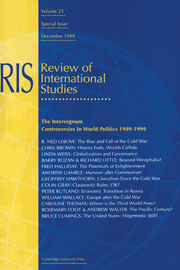Book contents
- Frontmatter
- Contents
- Acknowledgements
- Foreword
- Notes on contributors
- Introduction
- 1 The Rise and Fall of the Cold War in Comparative Perspective
- 2 History Ends, World Collide
- 3 Globalization and National Governance: Antinomies or Interdependence?
- 4 Beyond Westphalia?: Capitalism after the ‘Fall’
- 5 The Potentials of Enlightenment
- 6 Marxism after Communism
- 7 Liberalism Since the Cold War: An Enemy to Itself?
- 8 Clausewitz Rules, OK? The Future is the Past—with GPS
- 9 Mission Impossible? The IMF and the Failure of the Market Transition in Russia
- 10 Europe after the Cold War: Interstate Order or post-Sovereign Regional System?
- 11 Where is the Third World Now?
- 12 Whatever Happened to the Pacific Century?
- 13 Still the American Century
- Index
3 - Globalization and National Governance: Antinomies or Interdependence?
Published online by Cambridge University Press: 05 November 2009
- Frontmatter
- Contents
- Acknowledgements
- Foreword
- Notes on contributors
- Introduction
- 1 The Rise and Fall of the Cold War in Comparative Perspective
- 2 History Ends, World Collide
- 3 Globalization and National Governance: Antinomies or Interdependence?
- 4 Beyond Westphalia?: Capitalism after the ‘Fall’
- 5 The Potentials of Enlightenment
- 6 Marxism after Communism
- 7 Liberalism Since the Cold War: An Enemy to Itself?
- 8 Clausewitz Rules, OK? The Future is the Past—with GPS
- 9 Mission Impossible? The IMF and the Failure of the Market Transition in Russia
- 10 Europe after the Cold War: Interstate Order or post-Sovereign Regional System?
- 11 Where is the Third World Now?
- 12 Whatever Happened to the Pacific Century?
- 13 Still the American Century
- Index
Summary
‘Regardless of how you define or measure it, globalization is real and its impact on state power is significant’, says the globalist. ‘But how do you know?’ replies the sceptic. In this opening interchange one sees the origin of a controversy that after almost a decade shows few signs of abating. Globalists continue to maintain that there are big, fin-de-siècle transformations under way in the world at large, which can be laid at the door of something called globalization. This new era—popularized as a ‘world without borders’ and symbolized by the dismantling of the Berlin Wall—ostensibly came into its own where the Cold War left off. Globalists of all shades see a new world order in the making, marked by the de-territorialization of economic and political affairs, the ascendance of highly mobile, transnational forms of capital, and the growth of global forms of governance. By the same token, globalization sceptics, scrutinizing very similar empirical terrain, continue to pose the same insistent question. The dispute between globalists and sceptics is not about the reality of change; it is about the nature and significance of the changes under way as well as the driving forces behind them. ‘There is something out there’, agree the sceptics, but it is not necessarily, or even primarily, responsible for what is going on ‘in here’. The changes that fundamentally interest globalists are usually less economic than political. That is to say that their efforts to analyse or demonstrate economic change—the extent to which national economies have become more interconnected through trade, production, finance, and the growing web of international rules and institutions—are often a prelude to the political project.
- Type
- Chapter
- Information
- Publisher: Cambridge University PressPrint publication year: 2000

